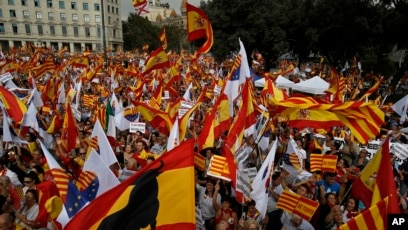

How does it become blackmail to garner more concessions from Spain?ĪLT: This sad sand-trapping has a history. They say around 40 percent of people participated (of all 5.4 million eligible voters), but it is impossible to know because there was neither an electoral roll nor a public impartial organisation and they never said how many people had the right to participate – it was just symbolic.Īnd since then, Catalonia's independence aim has stalled in a quagmire of wishful thinking, a Marxian "sigh of the oppressed creature" that it's both heart-warming and ineffectual.Ĭatalans are running a grass roots pro-independence movement. In due time, they approved a bill in parliament and called a referendum, but when the Spanish constitutional court forbade it they complied, stepped back, and organised a mock-referendum instead, just a rally to show off and hide their breach of election promise, without any guarantee whatsoever. Catalan parties won 2012 elections promising a "process" to have a referendum over Catalonia's independence in two years time regardless of what Spain might do. Why do you think separation of Catalonia from Spain is "wishful thinking"?Īlfons López Tena: 2014 "unofficial vote," as some call it, was not exactly so. Over 80 percent of Catalans voted for independence in an unofficial 2014 non-binding vote. A lawyer and public notary, Tena removed himself from the movement and today sees Catalonia's independence as "wishful thinking." Though he disassociated himself from separatist politics and retired from public life after having a stint as a member of the Catalan parliament, he says the demand for independence is out of step with reality.Īlfons Lopez Tena formerly headed the Catalan Solidarity for Independence and was associated with the independence movement since his college days. TRT World spoke with Alfons Lopez Tena, a former pro-independence leader of Catalonia.
#Catalonia spain independence pro trial#
Defying the Spanish government, the separatist leaders gained leverage from Mas's court trial as they aggressively pushed their secessionist drive across Catalonia, demanding a formal vote for independence in September. While facing court trial, Mas received support from Catalonia's separatist parties, which hold a majority in the local assembly. Nearly 80 percent of Catalans voted for seceding from Spain. Mas was punished for staging an informal independence referendum in 2014, when he was the president of Catalonia. In early March, Artur Mas was found guilty of disobeying the Spanish constitutional court and barred from holding public office for two years. A large majority, however, wants a referendum.

Alfons López Tena – a former Catalan MP – has grown disillusioned with the independence movement as he believes it's been stuck in a "quagmire of wishful thinking."Ī recent poll conducted by a Catalan public institute recorded 44.9 percent of Catalans want independence while 45.1 percent don't. Spain has warned Catalans against holding a referendum vote in September this year.


 0 kommentar(er)
0 kommentar(er)
